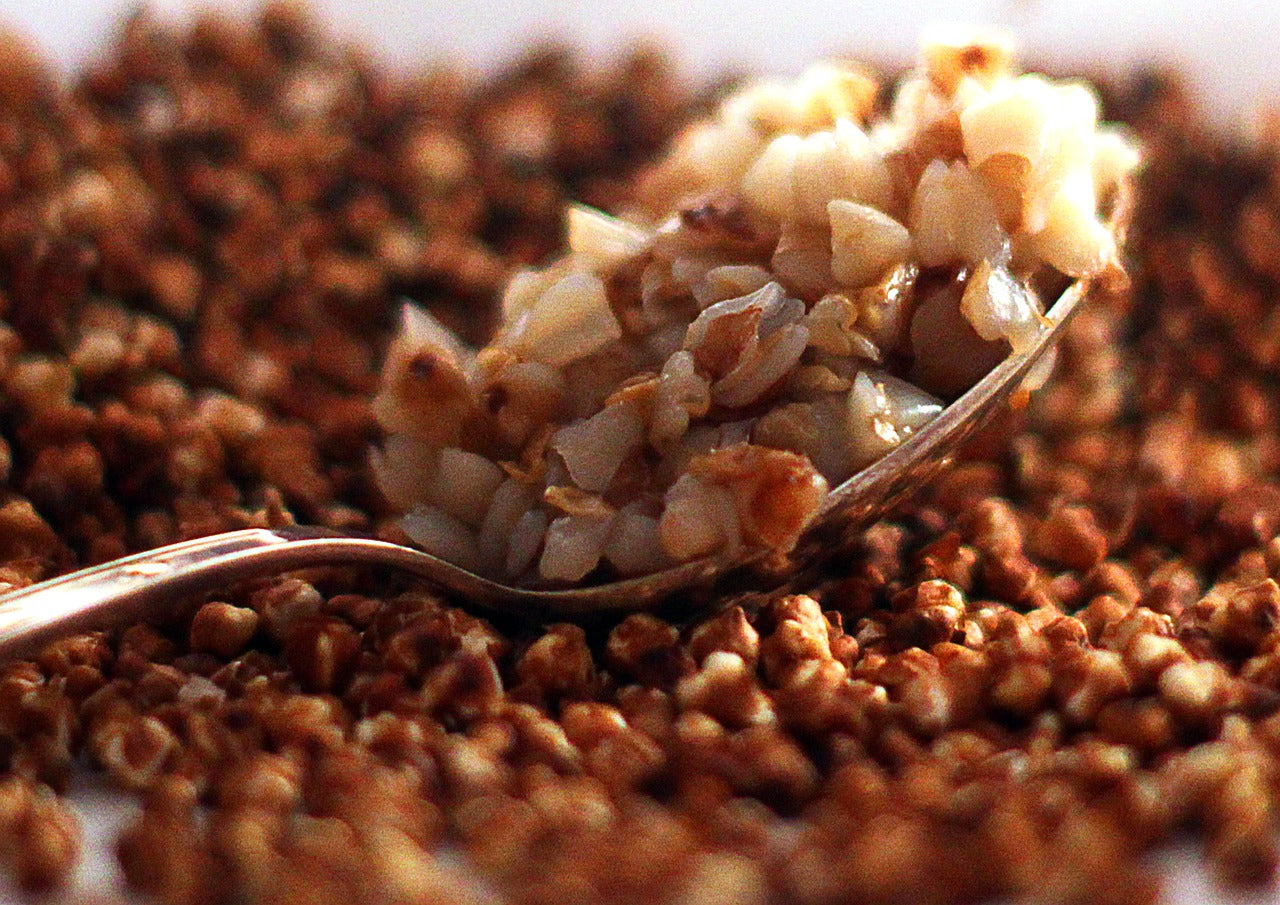
Why Eating Buckwheat Is Really Smart
Odds are, if you’ve heard of buckwheat, you might have some misconceptions about this type of food.
Inside of alternative health circles, buckwheat has become popular seemingly overnight. Kind of like the scrawny kid in high school who grew 12 inches and 60 pounds over the summer.
The biggest reason it’s surged in popularity is because it’s gluten-free.
Interestingly enough, people think it’s a cereal grain (so, gluten), but that’s not true.
It is listed as a whole grain, but only for culinary purposes. Compositionally, it’s a lot more like rhubarb or sorrel than anything else.
Below, I’m going to cover 4 of the best reasons to consider making buckwheat a consistent part of your diet.
This isn’t an extensive overview, but, in my opinion, the following reasons are some of the soundest based on available research.
4 Reasons to Start Eating Buckwheat
Like I mentioned, buckwheat is not a grain. It’s actually a fruit seed and is closer in relation to rhubarb than it is to wheat and other cereal grains.
Because this is true, it means buckwheat exhibits some demonstrably positive effects on your health.
1 – It can help maintain regulate blood sugar level:
Perhaps one of the most exciting ways buckwheat can help better your health is through its ability to maintain blood glucose level.
One of the most exciting compounds found in buckwheat is called D-chiro inositol.
Research indicates this substance is able to help increase insulin sensitivity which is important for the proper regulation of blood sugar.
Researchers in Canada believe the introduction of buckwheat in the diet might be an effective way to treat diabetes.
Their findings were published in the Journal of Agricultural and Food Chemistry.
Here’s what they found:
In a placebo-controlled study, a single dose of buckwheat seed extract lowered blood glucose levels by 12-19% at 90 and 120 minutes after administration when fed to laboratory animals with chemically-induced diabetes. No glucose reduction was seen in animals given placebo.
The component in buckwheat responsible for its blood glucose-lowering effects appears to be chiro-inositol, a compound that has been shown in other animal and human studies to play a significant role in glucose metabolism and cell signaling. While researchers do not yet know precisely how it works, preliminary evidence suggests chiro-inositol makes cells more sensitive to insulin and may even act as an insulin mimic.
Results of the Canadian study were so promising that one of the lead investigators, Roman Przbylski, is currently collaborating with Canadian-based Kade Research to develop new buckwheat varieties with much higher amounts of chiro-inositol.
Although the animals used in this study had the equivalent of Type 1 diabetes in humans, the researchers are confident that buckwheat will exert similar glucose-lowering effects when given to animals with Type 2 diabetes, which is the next study on their agenda. Type 2 or non-insulin dependent diabetes, which is by far the most common form in humans (90% of diabetes in humans is Type 2), is characterized by an inability of cells to respond properly to insulin.
One of the other reasons it’s believed to be a powerful blood sugar regulating agent is because of how much magnesium it contains.
1 cup of buckwheat contains 21% of your daily value of magnesium.
Magnesium is an incredibly important nutrient, as it plays a role in over 300 separate processes your body needs for optimal health. AND most people are deficient in it,
Since magnesium is essential when it comes to insulin and glucose production, it stands to reason consuming enough buckwheat can have a stellar effect on blood sugar too!
2 – It might help increase immunity:
A recent batch of research indicates foods high in fiber are helpful in reducing the chance of breast cancer in certain segments of the population. So not only does it keep you regular, it helps increase immunity!
It was noticed pre-menopausal women were those who received the most benefit, as noted in a study published in (Cade JE, Burley VJ, et al., International Journal of Epidemiology).
The study followed 35,972 participating women and noted when pre-menopausal women ate more than 30 grams of fiber they had half the risk of developing breast cancer compared to those who ate less than 20 grams a day.In particular, the fibers provided by whole grains (buckwheat is considered a whole grain which has led to some confusion) are the most effective at fighting the formation of breast cancer.
Women who were to eat at least 13g or more of whole grain fiber were found to have a reduced risk of around 41% compared to women who only ingested 4g or less.
1 cup of buckwheat contains about 5g of fiber, making it an excellent choice to help increase immunity.
Surprisingly, the benefits for post-menopausal women were also observed.
Results of a prospective study involving 51,823 postmenopausal women for an average of 8.3 years showed a 34% reduction in breast cancer risk for those consuming the most fruit fiber compared to those consuming the least. In addition, in the subgroup of women who had ever used hormone replacement, those consuming the most fiber, especially cereal fiber, had a 50% reduction in their risk of breast cancer compared to those consuming the least. Int J Cancer. 2008 Jan 15;122(2):403-12.
3 – It’s loaded with inflammation fighting antioxidants:
I love foods containing rich amounts of antioxidants. Fortunately, buckwheat is an all-star food when it comes to total antioxidant content.
It’s rich in antioxidants like oligomeric proanthocyanidins. These polyphenolic compounds are helpful at reducing the effects of free-radicals in the body.
Additionally, it’s rich in one of the most important antioxidants around, known as glutathione, along with superoxide dismutase. These compounds are also heat-stable and survive the cooking process with buckwheat.
By helping to protect cellular DNA, they’re quite effective at combatting things like liver damage, toxic build-up, age-related memory loss, poor heart health and more.
4 – It can help lower cholesterol:
Buckwheat’s known to be a wonderful food for heart health.
One of the reasons buckwheat is so good for your heart is because of its protein content.
In particular, it’s got a great balance of heart-healthy amino acids which are great for lowering cholesterol.
Back in 1997, a group of Japanese scientists found there was a specific protein in buckwheat that was effective at lowering cholesterol in rats.
Most interesting was the rats were specifically given a high-cholesterol diet…and the protein still helped lower cholesterol.
And, a study University of Wisconsin-Madison suggests that buckwheat protein decreases the absorption of cholesterol.
Remember, not all cholesterol is bad.
HDL is good, and LDL is bad.
And the nice thing is, there’s proof buckwheat lowers the bad stuff and boosts the good. In a survey of 805 Yi, Chinese researchers were able to prove the buckwheat lowered LDL cholesterol and raised HDL.
Meaning it’s really good for your heart.
Want to Get More Buckwheat In Your Diet?
Just get your hands on some recipes using buckwheat in pancakes etc.
That’s how most people do it!
Talk soon,
Dr. Wiggy
www.HealthAsItOughtToBe.com



